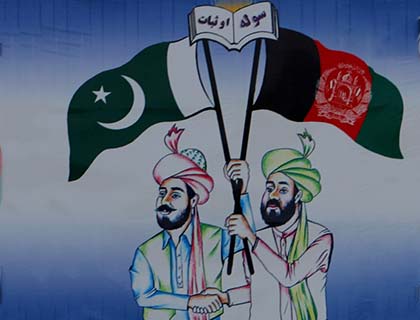Both Afghanistan and Pakistan have been cooperative neighbors, however the tales history recorded on various occasion diffuses this dictum, instead depicts a low level of confidence existing between the two. There might variant reasons, but one being is the altering state’s policy and fluctuating priorities. The porous border, along the Durand line, has turned the bone of discontents between Afghanistan and Pakistan, hosting numerous terrorists. Seemingly both Pakistan and Afghanistan claim to be front states, fighting insurgency and terrorism, yet proper cleanup operation is not undertaken, to crush the militant’s hideouts across the border. Consequently the terrorist easily undertake malicious activities and followed by safe back return to their hideouts that seem to be inaccessible if not impossible for security institutions of the two countries. A joint and coordinated operation may uncover the terrorists and foil their evil intention. Without soaring the confidence level, the two states can not undertake a joint venture to fight this very menace.
It was the US policy makers who introduced the Af-Pak neologism on an account deeming Afghanistan and Pakistan through single myopic lens as being single “theater of operation” despite marked differences. It was assessed the border separating the two countries, turned into breeding grounds of terrorists and most terrorist plots were planned on eastern side of border and hatched on the western side. It was under the influence of this dominant perception Afghanistan and Pakistan’s relation went quivering amidst dense fogs of accusations, previously. With the changed dynamics of war, policies altered and priorities shifted that consequently changed the parameters of relationship between Afghanistan and Pakistan. Most if not all affairs seem to have mediated that helped renovating the relation towards normalization.
To revitalize the Pakistan and Afghanistan’s relation formerly, Pakistan's Prime Minister Nawaz Sharif accompanying a high level delegation paid a visit to Kabul, met with President Ashraf Ghani and CEO Abdullah Abdullah to build close cooperative relations with Afghanistan. This will be the Prime Minister's second visit to Afghanistan and the first after the installation of National Unity Government in Kabul. This visit certainly further strengthens the positive momentum in bilateral relations and help intensify common endeavors in the pursuit of durable peace, stability and prosperity in the region. There were many issues of common interest that were put forth on the table during the joint press conference.
One of the issues that drew in was that of terrorism causing havoc in both the countries was affirmed to be tackled iron handed. Terrorism and potentially growing terrorism has turned a nightmare to Afghanistan and Pakistan alike. Earlier, it rendered believable that Pakistan interfered in political affairs of Afghanistan –the Afghan chapter of Taliban was deemed to have good ties with Pakistani government. Perhaps it was the first stance; the Prime Minister Sharif warned any militant or group to destabilize Afghanistan would be dealt with severely and such elements would be outlawed and hunted down. The statement can be deemed a red signal to Afghan Taliban who have waged spring offensive “Azam” against Afghan government and Pakistani Taliban against Pakistani state. It is assumed the two warring splintered group could be manipulated against the interest of the corresponding state. It is therefore, the two premiers resolved to stick to principle of non-interference in political affairs of each other.
On the other hand Pakistan too underlined some serious reservations, relative to the TTP whose high profile leadership has sought save sanctuaries on the Afghanistan’s side of border. The fugitive leader of TTP, Mullah Fazullah who is rumored to be in Afghan custody, is demanded to be handed over to Pakistani security officials, went into delusion.
It was an unending demand of the two countries to inflict heavy losses to insurgents and militants on the two sides of border. Pakistan started cleanup operation Zarb-e-Azab that forced many terrorists, ran cross the border. To minimize the porosity of the border and restrain unchecked movement of terrorists of TTP, Afghan government was asked to tighten security and launch operation on their side of border. The same resolve was renovated at the meeting stating coordinated operations would be planned and conducted on mutually agreed basis to target militant hideouts along the border, he continued. Undoubtedly, Pakistan and Afghanistan would succeed thwarting terrorism in rooting out the menace of terrorism through their firm determination and by adopting a comprehensive and coordinated strategy.
Both the premiers assured that an enemy of one state can not be friend of other. This refers to both Taliban offending the two states and cautions the neighboring state of their evil designs may not hatch in this piece of land.
Earlier, some realistic shifts crystallized on international political fronts; one, US labeled Taliban political reality in Afghanistan, freed them of terrors charges, set a political office in Doha, Qatar’s capital, in the bid to resume peace talks. Pakistan, did exercise her influence to push forth Taliban on the table of negotiation with Afghan government, as witnessed in previous talk that took place in Doha ended with positive note. The successful furtherance of peace talk might turn a milestone in the history of war torn Afghanistan and may bridge the mutual relationship of the two countries.
It should be learned both state faces a common invisible enemy of poverty, illiteracy, terrorism, extremism that are manifold malicious and threatening to the very existence of the two states. They should be defeated with iron claws before they turn unbeatable. It is timely and rational to two countries realize pragmatically the full potential of well resourced pool of human and material resources, including through expanding trade, increasing investments, improving infrastructure, building road and rail links, and enhancing energy collaboration; hence redefining the Af-Pak neology for extended cooperation and coordination in various fields of human endeavors between the two neighborly states.

